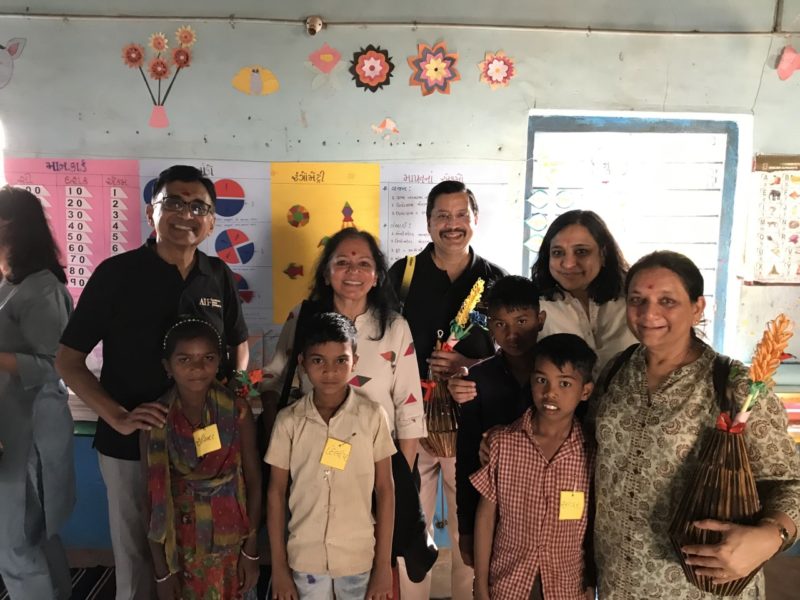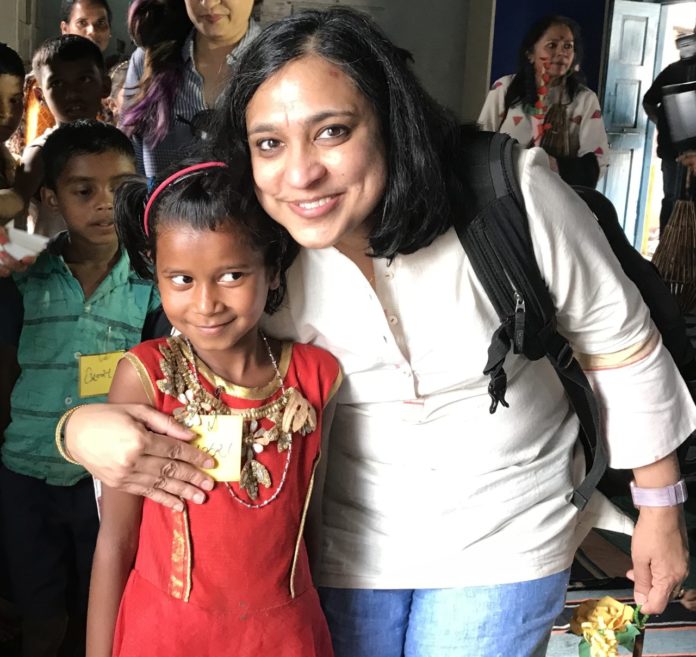By Anu Chitrapu
A group of us from AIF (American India Foundation) had the opportunity to visit a settlement of migrant workers in a small village in the Dang Forest of Gujarat in February, as part of the 2020 mission trip. It was a pleasant Spring day and it took us several hours of driving through some good roads and some not so good roads before we got to the AIF run center in the village.
We were greeted by a group of excited girls who were soon to graduate from nursing school. We walked through the abandoned houses in the village – empty since most of the inhabitants were away in towns and cities where they were working as construction workers or farm help so they could bring money home to their families in the village.
We met elementary school children who were being given tutoring after school. Most of these little children were either staying in a hostel or with relatives or living in their homes under the care of their older siblings. Children of migrant workers are usually separated from their parents up to 8 months a year. As a result their schooling is often interrupted and unsupervised with long absences being common. AIF’s LAMP (Learning and Migration Program) initiative was set up to provide a stable environment and program to keep these children in school and learning while their parents were away earning a livelihood. The program’s success was evident in the classroom and the children were thriving. Little did we know that hardship and disaster was only a month away.
With the current COVID19 pandemic, lockdown was issued in India for 21 days leaving migrant workers with no other option but to return to their villages. There are reports of people in overflowing buses, in the back of trucks and for some left with no other option, the long journey home was by foot. To get to the villages even in good times is difficult, with fear of illness and a lockdown the trip home is nothing short of a nightmare. Lack of awareness of the importance of hand washing, lack of water even if they knew the importance, lack of access to medical facilities and finally the economic distress to daily wage workers makes the pandemic orders of magnitude more difficult to deal with for migrant workers.

The online opportunities that the world is discussing now for the continuing education of children are not something that can be delivered easily to families without computers at home. But it is really, really important to continue the education for this population of children who can very easily slip back into a complete lack of education due to the economic distress their families are currently facing and will in all likelihood face for a while.
Keeping all this in mind, AIF has come up with a multi-generational plan to address primary needs immediately and quickly bring the children back to learning. The top priority is to make sure the migrant families are not going hungry. Rations consisting of grains and lentils are being delivered to the villages through the local panchayat. Along with food, the need for hygiene kits to the most vulnerable population is also very important to help fight the spread of the virus – kits containing essentials including hand sanitizer, soap and masks are also being distributed. Next, Personal Protection Equipment (PPEs) and Health Kits are being provided for frontline health personnel with support from AIF. These health professionals make home visits and it is important to protect them for both their benefit and to protect the women they care for. They serve as an important information channel to the families. Whether it is teaching them right hand washing techniques or how to care for their newborns, they serve as the primary channel for AIF, government agencies and other humanitarian efforts to reach the families. Finally, through the long period of lockdown, AIF will deliver educational content in the form of books that will be dropped off at the homes, some online content that can be viewed on phones and as soon as safely possible bring the children to centers that are equipped with resources. In fact, the LAMP team had already distributed storybooks so that children can improve their reading skills at home.
AIF has earlier worked in the relief needs and reconstruction efforts in several catastrophes in India, including the 2001 Bhuj earthquake, the 2004 Tsunami, the 2008 Bihar flood, the 2013 Uttarakhand flood, the 2014 Kashmir flood, the 2015 Chennai flood and the 2018 Kerala flood. We overcame the distress caused by those events and are confident we will overcome this one too. Stay safe and be well!
To support AIF’s efforts to help migrant families overcome the economic distress and support the most vulnerable communities, please donate at https://aif.org/donate/covid-19-response/















